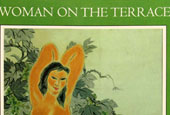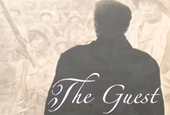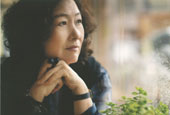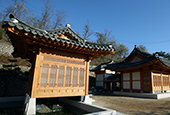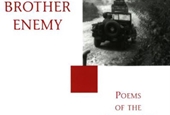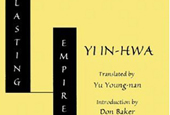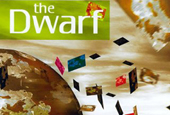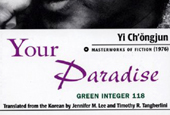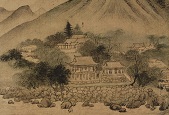"What Is Darkening," the fourth collection of poems by poet Ra Hee-duk (b.1966), has now been translated and published in English. The book talks about her concept of life and her faith. The book includes the poems "What Is Darkening," "Near the Peach Tree," "A Month for an Ax," "Raindrop," and "Obsessed with a Spider."
The poem "What is Darkening," lending its title to the book, starts with "When 5:44 becomes 5:45/ as I lie in the room," explaining what it means to be "darkening." For the poet, the passage of time means "darkening." As time takes warmth away from the world, a poplar falls in the distance and its bark begins to dry. It is the moment of death. Then, all memory stops at 5:45. In the end, the poet rubs her broken ribs alone and recalls her own past.
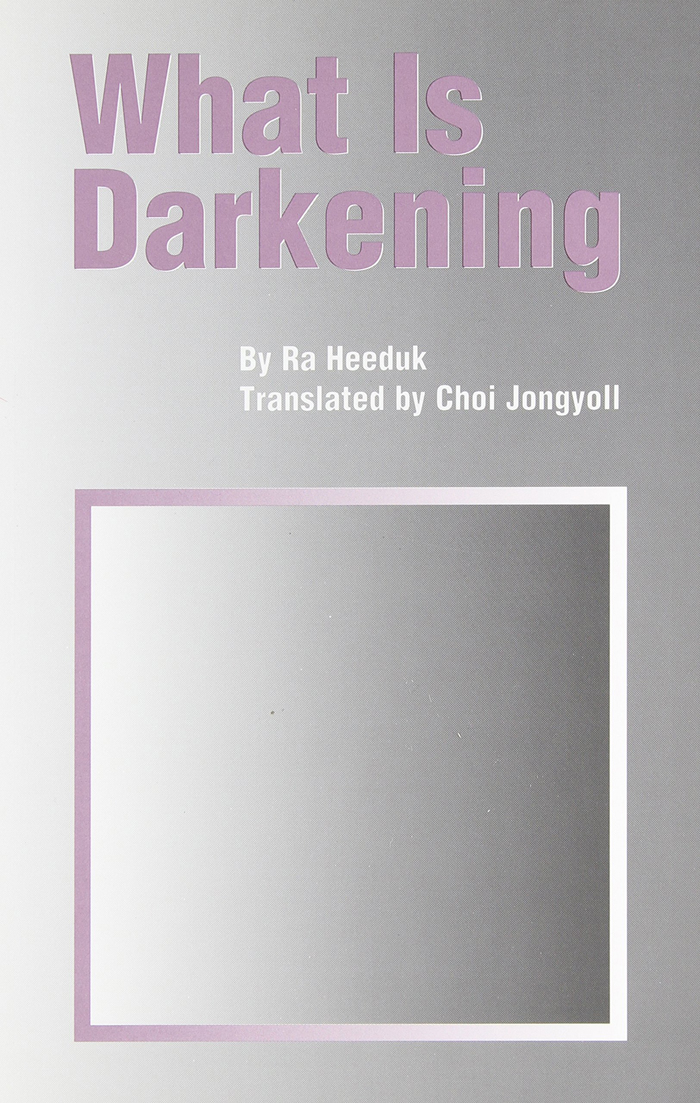
What is Darkening
When 5:44 becomes 5:45
as I lie in the room
when the sunlight which has shone on my body
as if it looks into a sad house
takes the warms away all of a sudden,
when a poplar falls in the distance
and its bark begins to dry,
when the dried back of my hand can't be seen any more,
when a memory stops at 5:45
and darkness deepens no more
and nobody moves the fallen tree.
My bones and skin which have endured such a long time
finally being to feel pain.
This evening, I'm rubbing my broken ribs alone
slow, slow, slowly ...
The poem "Near the Peach Tree" describes the process in which the narrator starts to understand the peach tree. In the beginning, the narrator has prejudices against the tree, believing that the tree has so many layers of mind and gives off shade in which people cannot rest. So he always keeps far away from the tree. However, as he is able to understand the peach tree's mind, he enters the shade and soothes the loneliness of the peach tree. The shade, which indicates the world of the peach tree, acts as a space that enables a perfect understanding and harmony between the narrator and the tree.
Near the Peach Tree
Without knowing why,
I didn't want to go near the peach tree
Which had too many minds.
I thought the tree with white and pink flowers
Hand no shade where I could sit
Hand passed, keeping far away from it.
I saw the tree at a distance.
Blinded by its dazzle,
I realized there were thousands of colors
Between white and pink.
The tree which wanted to bloom with so many colors
must have been lonely, but it might not perceive its loneliness
it took so long for me to understand so many hearts.
Around the time
when the flowers scattered,
under the shade of the peach tree which looked a bit bored
I heard in silence
the sound of evening's approach.
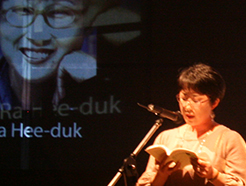
Ra Hee-duk was born in Nonsan, Chungcheongnam-do (South Chungcheong Province), in February 1966. In 1989, her poem "To Root" won a prize in the annual creative writing contest sponsored by the Joongang Ilbo. It was the starting point of her literary career. She has been working as an assistant professor of Literature & Creation at Chosun University since 2002.
Ra was awarded the Contemporary Young Artist Prize in literature in 2001, the 48th Contemporary Literature Prize in 2003, and the Il Yeon Literature Award in 2005. Most recently, she won the Midang Literature Award in December 2014. Ra published a number of poetry collections, including "That Word Dyed Leaves," "That Place is Not So Far," "A Disappeared Palm," "A Water Bucket Filled by Half," "Where Does the Purple Come From" and "What Is Darkening."
Choi Jong-yoll, who translated her poetry, is a Korean poet and translator himself. In 1997, he published a poetry book in Korean, "A Bullfighter Leans on the Morning Sunshine."
The book deals with nature, life, society and love, among other topics. In 2002, he translated "In the Land of Calm Morning" and "Reverence" by the Canadian poet Shawn James Morrissey into Korean, published in 2003 and 2004. His first English poetry book, "Sky Next," was published in May 2006.
By Limb Jae-un
Korea.net Staff Writer
jun2@korea.kr
Sources: Literature Translation Institute of Korea

The poem "What is Darkening," lending its title to the book, starts with "When 5:44 becomes 5:45/ as I lie in the room," explaining what it means to be "darkening." For the poet, the passage of time means "darkening." As time takes warmth away from the world, a poplar falls in the distance and its bark begins to dry. It is the moment of death. Then, all memory stops at 5:45. In the end, the poet rubs her broken ribs alone and recalls her own past.

Ra Hee-duk's poetry book, 'What Is Darkening'
What is Darkening
When 5:44 becomes 5:45
as I lie in the room
when the sunlight which has shone on my body
as if it looks into a sad house
takes the warms away all of a sudden,
when a poplar falls in the distance
and its bark begins to dry,
when the dried back of my hand can't be seen any more,
when a memory stops at 5:45
and darkness deepens no more
and nobody moves the fallen tree.
My bones and skin which have endured such a long time
finally being to feel pain.
This evening, I'm rubbing my broken ribs alone
slow, slow, slowly ...
The poem "Near the Peach Tree" describes the process in which the narrator starts to understand the peach tree. In the beginning, the narrator has prejudices against the tree, believing that the tree has so many layers of mind and gives off shade in which people cannot rest. So he always keeps far away from the tree. However, as he is able to understand the peach tree's mind, he enters the shade and soothes the loneliness of the peach tree. The shade, which indicates the world of the peach tree, acts as a space that enables a perfect understanding and harmony between the narrator and the tree.
Near the Peach Tree
Without knowing why,
I didn't want to go near the peach tree
Which had too many minds.
I thought the tree with white and pink flowers
Hand no shade where I could sit
Hand passed, keeping far away from it.
I saw the tree at a distance.
Blinded by its dazzle,
I realized there were thousands of colors
Between white and pink.
The tree which wanted to bloom with so many colors
must have been lonely, but it might not perceive its loneliness
it took so long for me to understand so many hearts.
Around the time
when the flowers scattered,
under the shade of the peach tree which looked a bit bored
I heard in silence
the sound of evening's approach.

Poet Ra Hee-duk
Ra Hee-duk was born in Nonsan, Chungcheongnam-do (South Chungcheong Province), in February 1966. In 1989, her poem "To Root" won a prize in the annual creative writing contest sponsored by the Joongang Ilbo. It was the starting point of her literary career. She has been working as an assistant professor of Literature & Creation at Chosun University since 2002.
Ra was awarded the Contemporary Young Artist Prize in literature in 2001, the 48th Contemporary Literature Prize in 2003, and the Il Yeon Literature Award in 2005. Most recently, she won the Midang Literature Award in December 2014. Ra published a number of poetry collections, including "That Word Dyed Leaves," "That Place is Not So Far," "A Disappeared Palm," "A Water Bucket Filled by Half," "Where Does the Purple Come From" and "What Is Darkening."
Choi Jong-yoll, who translated her poetry, is a Korean poet and translator himself. In 1997, he published a poetry book in Korean, "A Bullfighter Leans on the Morning Sunshine."
The book deals with nature, life, society and love, among other topics. In 2002, he translated "In the Land of Calm Morning" and "Reverence" by the Canadian poet Shawn James Morrissey into Korean, published in 2003 and 2004. His first English poetry book, "Sky Next," was published in May 2006.
By Limb Jae-un
Korea.net Staff Writer
jun2@korea.kr
Sources: Literature Translation Institute of Korea
